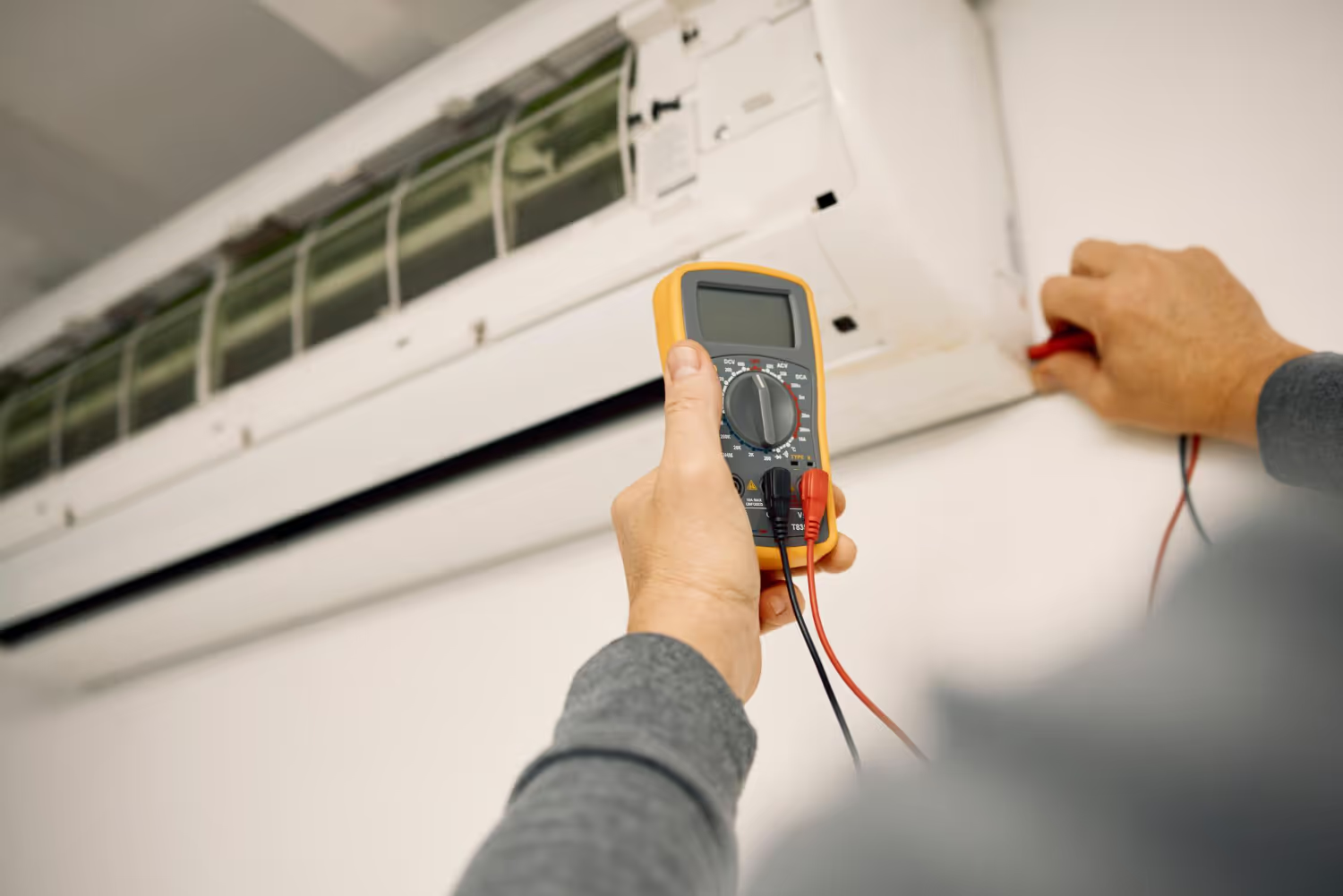How to Identify Electrical Problems in Your Oklahoma City AC System

An air conditioner that powers down on a hot summer afternoon in Oklahoma City can quickly go from inconvenient to urgent. In many cases, the root of the problem starts with a hidden electrical issue. These problems tend to go unnoticed until the system stops working altogether or becomes unsafe to operate. That is why recognizing early signs of electrical failure in your AC system can help prevent more serious damage and discomfort.
Electrical issues can affect more than just your comfort. They can interrupt consistent cooling, raise your energy bills, and pose safety concerns for your home. Faulty wiring, old components, or a tripped breaker can all cause your air conditioner to act up. If your AC system starts to behave unpredictably or will not respond the way it should, there is a good chance something is wrong behind the scenes with the electrical components.
Common Electrical Problems in AC Systems
AC systems rely on a series of electrical components to operate properly. When any one of these parts fails, the system can break down or become a hazard. Here are some of the electrical problems that commonly affect AC systems in Oklahoma City:
- Tripped circuit breaker: This is often the first sign of an overworked or overheating system. If the breaker repeatedly trips when the AC kicks on, this could point to overloaded circuits, a failed component, or a short.
- Damaged or frayed wiring: Wear and tear from age, pests, or poor installation can all lead to damaged wiring. Exposed wires are not only a fire hazard but can also cause uneven power flow to your AC unit, making it run improperly or not at all.
- Faulty capacitors: Capacitors help start the motor and keep it running. When they wear out, your air conditioner may struggle to turn on or fail to stay powered. A loud clicking sound, slow startup, or humming noise can all point to capacitor issues.
- Contactor problems: The contactor is a switch that controls the flow of electricity to your AC’s compressor and fan motor. When it fails, power may not reach the components at all, or it may get stuck and keep running nonstop.
- Burnt out relays or fuses: These act as protective parts for the system. When one goes bad, it can result in the system not powering on or components overheating.
Some of these issues are fairly easy to spot, while others may go unnoticed until they cause larger breakdowns. For example, if your system trips the breaker once and then works fine, it might not seem like a big deal. But if it starts happening more often, or you start smelling something like burnt plastic near the unit, that is a clue there is more happening behind the scenes.
Each of these problems points to a different part of your AC’s electrical design, so identifying which one is to blame requires a trained eye. If ignored, even a small issue may lead to complete system failure or safety risks down the line.
Signs of Electrical Problems in Your AC System
Recognizing the early signs of electrical trouble can help you act fast before the issue gets worse. Residential AC systems in Oklahoma City often give off subtle warning signals when something is not working as it should. If you are aware of these red flags, you can reduce the chance of more expensive or dangerous problems later.
Here are signs that may indicate electrical issues in your AC system:
1. Breaker trips frequently: If your AC causes the breaker to trip regularly, it might be drawing too much power or there could be a short somewhere in the wiring.
2. AC will not start or stops randomly: If your thermostat is set correctly but the unit will not turn on, or it shuts off without cooling the space, it could be an electrical disconnect or internal component failing.
3. Burning smell or smoke: Any hint of a burnt smell, especially coming from the vents or near the outdoor unit, should be taken seriously. This might suggest wiring insulation is melting or parts are overheating.
4. Unusual buzzing, clicking, or humming: Electrical components like contactors and capacitors make noise when they fail. If you hear clicking but the unit does not turn on, that is a sign the parts are not engaging correctly.
5. Inconsistent cooling: Electrical faults can affect how well your system cools. One room might feel cold while another feels warm, or the air pressure might be off. This could mean sensors or circuits are not feeding the correct inputs.
Paying attention to these signs not only helps you stay cool during the summer but also protects your system and your home from expensive and hazardous breakdowns. If something seems off with your AC, it is better to have it checked promptly by a professional. Electrical issues do not usually fix themselves—they get worse as the system keeps running under stress.
The Importance of Professional Diagnosis
Electrical issues in your AC system are often hard to detect without the right experience. What looks like a small glitch, like a fan that lags before starting or a unit that keeps shutting down, could actually be the result of worn wiring, failing relays, or problems in the control board. While it might seem tempting to troubleshoot on your own, trying to fix electrical components without the right tools or training can cause more harm than good.
Working with electricity carries significant risk. Exposing wires, handling capacitors, or shifting internal connections may lead to electrical shock, further damage to the unit, or even a fire hazard. Diagnosing modern residential AC systems also involves working with integrated components that rely on one another to function. A misstep in one area could throw off the balance of the whole system.
When you hire our professionals, you are getting trained eyes on every piece of the system. They do not just look at the surface issue—they identify the root of the failure and examine surrounding parts to make sure the rest of the system is not compromised. This kind of thorough diagnosis reduces the risk of future malfunctions and ensures the unit is safe to run throughout the summer heat in Oklahoma City.
AC systems are designed to last, but only when every component works the way it should. If the electrical system malfunctions once, it will likely repeat that failure again unless fully resolved. Investing in proper diagnosis and repair the first time not only prevents breakdowns but helps your system stay accurate, energy-efficient, and safe.
Preventative Measures for Avoiding Electrical Problems
While some problems come with age or wear, many electrical issues in AC units can be avoided with proper care. If you want to reduce the chances of expensive repairs or sudden loss of cooling in the middle of the Oklahoma City summer, some proactive steps go a long way.
Here is how to reduce electrical risks to your AC system:
- Schedule routine inspections once or twice a year. A technician can spot emerging issues like weakening capacitors or burnt contacts before they cause failure.
- Keep the area around the indoor and outdoor units clean and dry. Moisture and debris can affect electrical parts and attract pests.
- Do not ignore short-term problems like occasional humming noises or delayed startups. These can indicate wear that grows over time.
- Replace air filters regularly. Poor airflow can stress the motor and increase its draw on the electrical system.
- Make sure your thermostat works correctly. Faulty thermostats may lead to inconsistent commands that wear out wiring and control boards.
Following these steps creates better performance in your unit and lowers the odds of hidden malfunctions. The goal is to keep your system running without stress, and that is easier when technicians have a chance to maintain it before something breaks.
One example is a home in Oklahoma City where the AC stopped working during a string of warm days. The homeowner had ignored the repeated tripping of a breaker for weeks, assuming it was a fluke. When they finally called for help, our technicians discovered a damaged wire that had started melting its insulation. If addressed earlier, it could have been a minor fix. Instead, it required a full repair of the affected section.
Taking care of problems right away and booking regular checkups often prevents this kind of issue from snowballing.
Keeping Your AC System Safe and Efficient
Electrical failures in your AC system often start small—a delay here, a flicker there—but they can lead to serious system damage or safety hazards if left alone. Watching for signs like smells, noise, or uneven performance helps you stay a step ahead. And knowing when to call our technicians can mean the difference between a fast repair and a system-wide replacement.
By staying alert to changes in how your AC behaves, you protect more than just the cooling power in your home. You protect the system’s lifespan, the energy costs over the season, and the safety of your electrical infrastructure. Regular maintenance, prompt repairs, and full inspections all work together to prevent breakdowns.
Keeping your AC system working well during the summer in Oklahoma City comes down to quick action and knowledgeable support. If you think something might be wrong, it is better to play it safe and have it checked. Electrical issues rarely fix themselves, and catching them early gives you more control over outcomes, time, and repair costs.
If you notice any issues with your AC system's performance, it's important to address them before they turn into bigger problems during an Oklahoma City summer. Trust Direct Air to provide reliable AC repair in Oklahoma City that restores efficiency and safety. For a quick estimate or to book a service visit, please contact us today.

Financing
.png)







